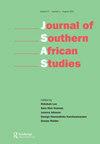Politics from the Pits: Artisanal Gold Mining, Politics and the Limits of Hegemonic State Domination in Zimbabwe
IF 0.7
4区 社会学
Q2 AREA STUDIES
引用次数: 0
Abstract
In post-2000s Zimbabwe, artisanal and small-scale gold mining (ASGM) has become one of the major economic activities that provides income and livelihood opportunities to millions of people. The article attempts to make sense of how such mining activities intertwined with the country’s political economy and became implicated in shaping the dynamics of local and national politics. Taking the case of Kwekwe district, situated at the heart of the country, the article argues that ASGM as a socio-economic and political activity and a general way of life became the core of contemporary local Zimbabwean political relations, interactions and participation, and indeed a potent motor in party–state expansion and power consolidation. The new arrangements of politics, while facilitating the ruling Zimbabwe African National Union(Patriotic Front) (ZANU[PF])’s strong hold on power and territory in the face of powerful opposition politics represented by the Movement for Democratic Change (MDC), also encouraged local actors to expand their own statuses and influence away from political marginality towards the traditional political and elite centres such as the capital, Harare. The article shies away from literature that has emphasised state domination and subordination; this is in order to demonstrate that the relationship between the new political actors (buoyed by gold extraction) and the state is a flexible network of bargains and negotiated fusions, exchanges and appropriations. Largely ethnographical, it engages with an aspect of artisanal mining and politics in Zimbabwe that has yet to receive systematic scholarly attention.矿坑里的政治:手工金矿,政治和津巴布韦霸权国家统治的极限
21世纪后的津巴布韦,手工和小规模金矿开采(ASGM)已成为为数百万人提供收入和生计机会的主要经济活动之一。这篇文章试图弄清楚这种采矿活动是如何与该国的政治经济交织在一起,并影响到地方和国家政治的动态。以位于国家中心的Kwekwe地区为例,文章认为,ASGM作为一种社会经济和政治活动,以及一种普遍的生活方式,成为当代津巴布韦当地政治关系、互动和参与的核心,实际上是党国扩张和权力巩固的有力动力。新的政治安排一方面有利于执政的津巴布韦非洲民族联盟爱国阵线(ZANU[PF])在面对以争取民主变革运动(MDC)为代表的强大反对派政治时对权力和领土的牢牢控制,另一方面也鼓励地方行动者扩大自己的地位和影响力,从政治边缘走向传统的政治和精英中心,如首都哈拉雷。这篇文章回避了强调国家统治和从属关系的文学作品;这是为了证明新的政治参与者(由黄金开采支撑)与国家之间的关系是一个灵活的交易和谈判融合、交换和拨款网络。主要是民族志,它涉及津巴布韦手工采矿和政治的一个方面,尚未得到系统的学术关注。
本文章由计算机程序翻译,如有差异,请以英文原文为准。
求助全文
约1分钟内获得全文
求助全文
来源期刊

Journal of Southern African Studies
AREA STUDIES-
CiteScore
1.40
自引率
0.00%
发文量
73
期刊介绍:
The Journal of Southern African Studies is an international publication for work of high academic quality on issues of interest and concern in the region of Southern Africa. It aims at generating fresh scholarly enquiry and rigorous exposition in the many different disciplines of the social sciences and humanities, and periodically organises and supports conferences to this end, sometimes in the region. It seeks to encourage inter-disciplinary analysis, strong comparative perspectives and research that reflects new theoretical or methodological approaches. An active advisory board and an editor based in the region demonstrate our close ties with scholars there and our commitment to promoting research in the region.
 求助内容:
求助内容: 应助结果提醒方式:
应助结果提醒方式:


